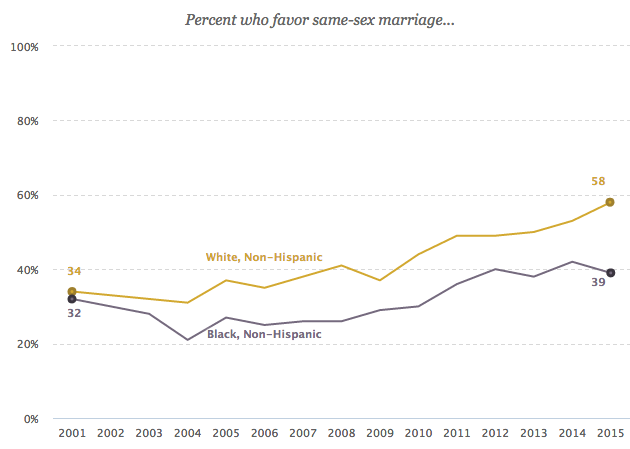Recent discussions about the white working class and racism (me, DeBoer, Mystal, et al) have me flashing back to the fascinating world of 2008 LGBT politics. In that year, the majority of Black voters came out and voted in favor of proposition 8, a successful referendum that sought to eliminate same-sex marriages in California. Needless to say, this put LGBT writers and activists in a tough spot: do you take out your frustrations and demonize Black people as anti-gay bigots fighting against equality or do you blame yourself for failing to adequately engage Black people on the issue?
After some initial grumbling, the consensus position was to blame themselves for not engaging. In a post at The American Prospect titled “Engaging, Not Demonizing,” Adam Serwer argued:
Andrew Sullivan agrees that “this community needs to be engaged not demonized, and we haven’t engaged enough,” but in the weeks before the vote Sullivan was telling everyone on the Internet that the black community was “the most homophobic ethnic community” which sounds a lot to me like demonizing. That’s not the way to build a political coalition, anymore than Barack Obama won the election by telling white people how racist they are.
Dean Spade weighed in similarly:
Current conversations about Prop 8 hide how the same-sex marriage battle has been part of a conservative gay politics that de-prioritizes people of color, poor people, trans people, women, immigrants, prisoners and people with disabilities. Why isn’t Prop 8’s passage framed as evidence of the mainstream gay agenda’s failure to ally with people of color on issues that are central to racial and economic justice in the US?
Jessie Daniels at The Society Pages shared similar sentiments:
I heartily agree with the authors’ re-frame of the failure of Prop 8. The mainstream gay political movement has failed to do the hard work of coalition building with people of color, whether straight or LGBT. While I’m not prepared to argue that gay marriage is inherently racist as some do, I do think the fight for marriage equality has got to re-think it’s white-led agenda and connect to broader social justice goals in order to be successful.
Of course, white LGBT advocates never did successfully engage Black people well enough to bring them around on the gay marriage cause. Instead, what happened is gay marriage advocates ran up their support among whites so much that it didn’t really matter what Black people (a 13% minority) wanted. Put bluntly, majoritarian support for LGBT rights was largely won through a GOP-like demographic strategy of maximizing white margins.

Nonetheless, what’s interesting to me about the 2008 moment is the rallying cry of “Engaging, Not Demonizing.” The liberal response to Blacks opposing gay marriage was not to demonize them as anti-gay bigots that can go fuck themselves for all liberals are concerned. They certainly could have responded that way. As history shows, winning the support of most Black people was not remotely necessary to win gay marriage. But instead liberals responded with calls for further engagement, calls for further outreach, and, crucially, calls for finding “broader social justice goals” and “issues that are central to racial and economic justice” that could possibly unify the LGBT and Black causes.
This is contrasted with some recent liberal sentiments about lower class whites, which are more about Demonizing, Not Engaging. Specifically, the fact that many lower class whites are racist is enough grounds it seems for many Discourse Liberals to say to hell with them.
DeBoer argues that this new posture shows that liberals have evolved towards more conservative modes of thinking, modes which emphasize that only the morally good are worthy of concern:
Yet in a deeper sense I think conservatives have won a major victory, one not understood by them or their antagonists: they have written the notion that dignity, respect, and material security must be earned into the progressive imagination. They have made the notion of a moral meritocracy inescapable in American civic life
While I’d agree with DeBoer that this is a particularly conservative approach, the reality is that these Discourse Liberals do not actually adhere to the approach for populations other than lower class whites. As discussed above, they didn’t and don’t say “to hell with Black people’s needs” just because most Black people oppose LGBT marriage rights. And right-wing efforts to talk about how many Muslim communities across the world hold views about women and LGBT people that liberals find abhorrent are shrugged off instantly. For these and other groups, being morally problematic (under the liberal framework) does not make them undeserving of dignity, respect, and material security.
So what’s going on, then? If liberals haven’t evolved generally towards a “moral meritocracy” worldview, then why do they seem to apply that worldview to the case of lower class whites? I don’t pretend to know the answer to this, but Emmett Rensin suggested to me earlier that the main dividing line here is whether liberals think you will vote for Democrats or not. That is, lower class whites are seen as largely outside of the Democratic coalition and therefore their moral failings are seized upon as adequate grounds for dismissing them and their problems. But other groups, such as Blacks and Muslims, are seen as inside the Democratic coalition, meaning that when they hold morally degenerate views (again under the liberal framework), the proper remedy is not to dismiss and demonize them but instead to do more and better outreach. Which is to say, the moral high ground that Discourse Liberals stake out with regard to lower class whites is mostly motivated by a more crude partisan tribalism.
This is obviously just a speculation on Rensin’s part, but it seems plausible enough. At minimum, it accounts for why some groups are subject to moral meritocracy while others aren’t.